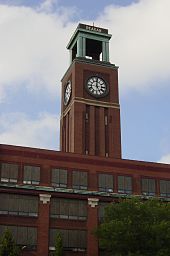J.C. Deagan, Inc.
J.C. Deagan, Inc. is a former musical instrument manufacturing company that developed and produced instruments from the late 19th to the mid-20th century. The company was founded in 1880 by John Calhoun Deagan and initially manufactured glockenspiels (orchestra bells). It was noted for its development of the xylophone, vibraharp (vibraphone), organ chimes, aluminum chimes, aluminum harp, Swiss handbells, the marimba, and orchestra bells. Church bells were revolutionized by Deagan through his design of tubular bells, and the NBC chimes were his creation.[2] Its former headquarters, the tower of which still bears the company name, is a landmark in the Ravenswood neighborhood of Chicago, Illinois.[3]
 | |
Formerly | List
|
|---|---|
| Private (1880–1977) Brand (1977–present) | |
| Industry | Musical instruments |
| Fate | Company acquired by Slingerland in 1977, then sold to Yamaha [1] |
| Founded | 1880 in St. Louis |
| Founder | John Calhoun Deagan |
| Headquarters | 1770 W Berteau Ave, , |
Area served | Worldwide |
| Products | Xylophones, glockenspiels, chimes |
| Owner |
|
Since 1984, Deagan is a brand owned by Yamaha,[4] which distributes and sells products with the Deagan name.[5][6]
History
The company was founded by John Calhoun Deagan (1853–1934), a professional clarinetist, in 1880. The J.C. Deagan company originally headquartered in St. Louis, Missouri, until it moved to Chicago, Illinois, in early 20th century. Deagan was unsatisfied with the intonation of the glockenspiels used in theater orchestras –which he had performed with– and he went on experimenting with the acoustics and tuning of the instrument. As a result of theses experiments, Deagan developed the first "scientifically tuned" glockenspiel. On the Sensations of Tone by German physician and physicist Hermann von Helmholtz served as strong inspiration for Deagan's advances.[7]
In 1978 the Deagan company was sold to Slingerland Drum Company, which added the Deagan instruments to its line of products.[8]
Slingerland then sold the Deagan company to the "Sanlar Corporation" –a corporation set up by Sligerland accountant Larry Gasp and his wife Sandra–[4] in 1984.[1][7][9] Meanwhile, the Deagan division of Slingerland was sold to Yamaha.[4]
Legacy

A 25 tubular bell set by Deagan is still in daily use at St. John Cantius Church of Chicago, using its original player rolls. This tubular set was originally at Laureldale Cemetery[10] in Reading, Pennsylvania and relocated to St. John Cantius in 1999.
The 97-bell carillon at the Stephen Foster Folk Culture Center State Park near White Springs, Florida, is one of the largest musical instruments ever produced in the Western Hemisphere, and the world’s largest tubular carillon in number of bells. It was installed during the summer of 1958. More than a year was required by Deagan craftsman to build the huge set of bells, the greatest single manufacturing project in the firm’s 78-year history of originating and producing a variety of percussive musical instruments well-known throughout the world. The Tower sustained extensive damage in a recent storm and currently is in Phase 1 of the restoration under the aegis of the Stephen Foster Citizen Support Organization, Inc.
Notable employees
- Clair Omar Musser, engineer, conductor, and marimba virtuoso
- Henry Schluter, engineer
References
- Deegan Archive on The Mallet Shop
- "The National Cyclopedia of American Biography". 43: 391–392. Archived from the original on 2016-04-22. Retrieved 2015-05-31. Cite journal requires
|journal=(help) - "Progress Building, AKA The Deagan Building". Ravenswood Lake View Historical Association.
- The Slingerland Book by Rob Cook
- Yamaha DC-9160B Deagan Chimes on Cosmo Music of Canada
- Yamaha DG1590B Deagan Bell on Yamaha Music London
- Hall of Fame: John Calhoun Deagan by James A. Strain on the Percussive Arts Society (archive), 4 Mar 2016
- 1979 Slingerland catalog
- Samuels, Rich. "The J.C. Deagan Company of Chicago". richsamuels.com. Retrieved 2016-01-09.
- Lauderdale Cemetery website